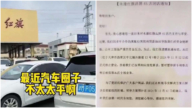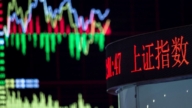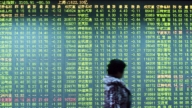【新唐人2014年03月20日讯】今年2月底,人民币下跌超过1%,改变了长期以来的升值趋势。18号,人民币汇率再度下跌,美元对人民币即期汇率开盘报6.1858元。虽然专家认为,人民币的估值已达到了一个长期均衡点,可是人民币的贬值可能刺破国内的楼市泡沫。
上周末(3月15号),大陆央行将人民币兑美元汇率日浮动区间扩大到2%。18号,美元对人民币即期汇率开盘报6.1858,较上一个交易日收盘价6.1781,贬值77个基点。创出近11个月低位。今年人民币已跌去2.5%。
美国《华尔街日报》认为,中共官员“几个月来一直在释放人民币市场化的信号,央行也在最近几周主导人民币下跌,这些都成了人民币浮动区间扩大的伏笔。”
中国人民银行2012年4月16号,才将美元/人民币汇率浮动区间由0.5%,扩大到了1%。
而自2月以来,大陆的资本流动已经大幅度降低。中国继2月份出口数据表现疲软之后,又有数据显示,从工业增加值到固定资产投资,再到零售额都在放缓。
另外,截至去年第三财政季度,中国的外债总规模已达8,230亿美元。人民币走软将导致清偿成本增加,等于外债增多。
中共商务部周二表示,近期人民币贬值,并不是政府为了支持外贸出口而有意为之。商务部新闻发言人表示,“随着人民币汇率形成机制改革的不断深化,汇率双向波动将成为常态。”
那么,央行为什么要主导人民币下跌,目地是什么?
大陆金融分析师任中道分析表示,中共当局在权斗中,藉由“经济牌”来打击那批既得利益的权贵们。
大陆金融分析师任中道﹕“之前江泽民,他是以贪腐治国,尤其他形成的中共权贵控制的国企,甚至把全民财富的资源转移到海外,然后再冒充外资进入中国进行套利,有利率的差和汇率的差,为了狙击这些权贵们——钱赚够了要跑,只好把人民币往低点打,这样,中间就没有多的利益可获取。”
中国交通银行国际首席策略分析师洪灏,日前在《福布斯》新闻网发表了《人民币贬值将刺破房地产泡沫》的文章。他表示,一般来说,一个国家可通过廉价的汇率推动出口,以增强外汇储备。然后,国家可以开始让货币升值,以便进行大规模的资产价值重估。一旦汇率升值到接近平衡点,资产价值重估将会停止。
2005年7月,中国开始进行人民币升值的汇率改革,当时中国的外汇储备只有8,000亿美元,但现在,这个数字已增长四倍,达到3万8000亿美元。与此同时,中国的房地产价格也已急升到泡沫水平。
洪灏表示,若以史为鉴,人民币贬值,将会是中国资产价格上涨的强大阻力,这些资产主要是房地产,而股票也将难以幸免。
大陆金融分析师任中道表示,中共权贵一旦掏空那些热钱外逃,中国房地产泡沫将破裂。
任中道﹕“假设一个老百姓买了一套房100万,市场这个房子已经不值100万,但是老百姓还要去还这个房贷,最后老百姓可能把这房子扔给银行,银行收到这些房屋的话,它也没办法用啊,它也不能变成现金。其实,归根结底,最后都是老百姓的钱在支撑着整个国家,和金融体系。中共权贵套完利就走了,政府也是,正忙着内斗,它不会管这些老百姓的死活。”
《华尔街日报》引述“摩根士丹利(Morgan Stanley)”亚洲外汇及利率策略主管肯德里克(Geoff Kendrick)的话说,随着今年人民币兑美元累计下跌2%,越来越多押注人民币升值的投资者遭受了损失。
他预测,那些借助“目标可赎回远期合约”这一流行方式,对冲人民币风险的企业及个人的账面损失,已达23亿美元。
而“德意志银行(Deutsche Bank)”驻上海的中国市场主管Beng-Hong Lee说,他的企业客户正担心人民币还会再贬值多少。
报导说,虽然近期人民币走低的幅度可能还不足以引发资金逃离,但汇率波动加剧可能会让一些投资者止步不前。
采访/易如 编辑/周平 后制/李勇
RMB Devaluation vs. Chinese Property Market
At the end of February this year, the
value of the yuan fell by more than 1%.
This changed the long-standing trend of RMB appreciation.
On March 18, the Renminbi (RMB) exchange rate fell
again, and traded at 6.1858 to the dollar upon opening.
Experts believe that although RMB value has
reached an equilibrium, this devaluation could
cause the domestic property bubble to burst.
On March 15, China’s Central Bank
doubled the yuan trading band to 2%.
On March 18, the RMB to dollar rate opened at 6.1858.
This is equivalent to depreciation of 77 basis points.
This is compared with the previous
trading day’s closing rate of 6.1781.
It has hit a new low in 11 months.
RMB has fallen 2.5% this year.
The Wall Street Journal commented that, “the
decision, foreshadowed by months of hints by
Chinese officials, followed a week long campaign
by the country’s central bank to weaken the yuan."
The People’s Bank of China had just doubled the
yuan’s trading band to 1% from 0.5% on April 16, 2012.
Since February this year, the Chinese
capital flow has been significantly reduced.
After a weak performance of exports in February,
data also showed a slow down in industrial added
value, fixed asset investment, and retail sales.
In addition, as of the third fiscal quarter of last year,
China’s total foreign debt reached $823 billion.
The weakening of RMB will result
in increased settling up costs.
That is equivalent to an increase in external debt.
The Chinese Communist Party (CCP) Commerce
Department stated on Tuesday that the recent
RMB devaluation was intended to support exports.
A Ministry of Commerce spokesman said that,
“with the mechanism formation of RMB exchange
rate through the deepening of reforms, two-way
exchange rate fluctuations will become the norm."
So, why did the central bank lead the fall of RMB?
Financial analyst Ren Zhongdao says that within power
struggles, the CCP is manipulating the “economic card".
This is to attack the officials with vested interests.
Ren Zhongdao, financial analyst: “Jiang Zemin
had ruled the regime with greed and corruption.
He turned state-owned enterprises into the CCP elite’s
source of wealth, and transferred national wealth overseas.
This returned to China as foreign investment for arbitrage,
to earn the interest difference and the exchange rate.
To combat these officials who escape overseas
with national wealth, the CCP has now brought
the RMB down to cut the interest difference."
Hong Hao, China Bank of Communications
Chief International Strategist, recently
commented in ForbesChina.com.
Hong thinks the RMB devaluation
will burst the real estate bubble.
He stressed that, in general, cheap exchange
rates will help a country to promote exports.
They will strengthen foreign exchange reserves.
Then, large-scale asset revaluation can be
carried out through currency appreciation.
Once the exchange rate is close to the
equilibrium point, asset revaluation will stop.
In July 2005, China started the exchange
rate reform of the RMB appreciation.
At that time, China’s foreign exchange reserve was only
$800 billion, but now has quadrupled to reach $3.8 trillion.
At the same time, China’s real estate
prices have soared to bubble levels.
Hong Hao stated that if one learns from history, devaluation
of RMB will pose strong resistance to elevation of asset
prices. These assets are mainly real estate and stocks.
Financial analyst Ren Zhongdao believes that
once CCP officials empty the hot money and run
overseas, China’s real estate bubble will burst.
Ren Zhongdao: “Suppose someone
bought a property for one million yuan.
The market value is less than one million now.
But this person still has to pay the mortgage.
Finally, this house may be taken back by the bank, which
has no use for the property, and it cannot become cash.
In fact, at the end, the country and the financial
system are supported by people’s hard earned money.
The CCP officials will leave after they get the hot money.
The government is also busy with infighting,
and will not care if the people live or die."
According to WSJ, “with the yuan down 2%
against the dollar this year, more of the bets
are losing money, said Geoff Kendrick, Head
of Asian Currencies and Rates at Morgan Stanley."
“He estimates that paper losses on one popular way
companies hedge their yuan exposure and individual
investors bet on the yuan, through what is known as
target redemption-forward products, have hit $2.3 billion."
“Beng-Hong Lee, Head of Markets for China at Deutsche
Bank AG in Shanghai, says his corporate clients are
concerned about how much more the currency will depreciate."
WSJ added, “while the recent declines likely aren’t big
enough to trigger a stampede out of the yuan, the added
volatility in the exchange rate may give some investors pause."
Interview/Yi Ru Edit/Zhou Ping Post-Production/Li Yong





























